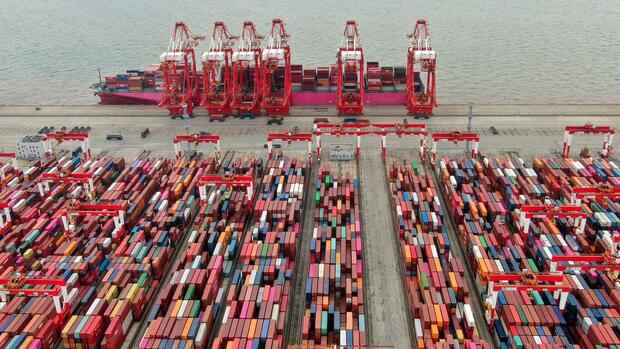Industrial production growth fell short of analysts’ forecasts.
(Photo: dpa)
Qingdao China’s economy suffered a severe setback in the past month. This is shown by data from the Chinese National Statistics Office published on Wednesday. Accordingly, the growth in retail sales, which is viewed as an indicator of consumption, slowed significantly in August to just 2.5 percent compared to the previous year.
In July it was still 8.5 percent. The value was thus far below expectations. Analysts polled by the news agencies Bloomberg had expected an average increase of seven percent in August.
Industrial production growth also fell short of forecasts. The value was only 5.3 percent – in July it was 6.4 percent. Analysts polled by the Reuters news agency had expected an increase of 5.8 percent year-on-year.
The markets reacted to the poor numbers on Wednesday. The Nikkei index was at times 0.5 percent lower at 30,510 points. The Shanghai stock exchange was 0.1 percent in the red. The index of the most important companies in Shanghai and Shenzen temporarily lost 0.7 percent.
Top jobs of the day
Find the best jobs now and
be notified by email.
Consumers in the second largest economy in the world have also been reluctant to spend. With the exception of luxury goods such as premium cars, consumption has so far not recovered sustainably from the slumps caused by the corona pandemic.
In August, the state purchasing managers’ index (PMI) for the service sector fell to 47.5 points – in the previous month it was 53.3 points. A value above 50 indicates growth, while anything below 50 indicates consolidation.
Strict corona measures burden the economy
There had been several new local outbreaks of the virus in China in the past few weeks. The Chinese government is pursuing a zero-case strategy. When new infections appear, mass tests are carried out, residents of entire city districts or blocks of houses are placed under strict quarantine for weeks, they are usually not allowed to leave their homes or have to go to central quarantine facilities.
The Chinese government is pursuing a zero-case strategy with regard to the corona virus.
(Photo: dpa)
Local authorities in southeast China’s Fujian Province are currently fighting an outbreak that has infected 186 people within a week. In China, where there were no or very few new cases for weeks at a time, this is a high number.
The strict measures have consequences. According to data from the Statistical Office, the catering industry recorded a decline of 4.5 percent in August compared to the same month last year, while sales of clothing fell by six percent.
According to experts, the fierce regulatory measures against the education and online games sector, among others, which are having an impact on the labor market, have contributed to the uncertainty among consumers. The government recently imposed strict guidelines on how long minors can play computers per week.
“The delta wave has severely affected Chinese growth, especially in the service sector,” writes Chen Jingyang, Greater China economist at HSBC Bank, in a recent analysis. “We expect a recovery in September, if the pandemic remains largely contained, and growth of 5.1 percent in the third quarter from a year earlier.” However, there are still numerous downside risks to watch out for.
“Regional virus outbreaks and the resulting stringent containment measures remain significant uncertainties for economic growth.” According to Chen, improvements in manufacturing and infrastructure investments are crucial.
More: Who will save the world economy – China or the USA?
.
